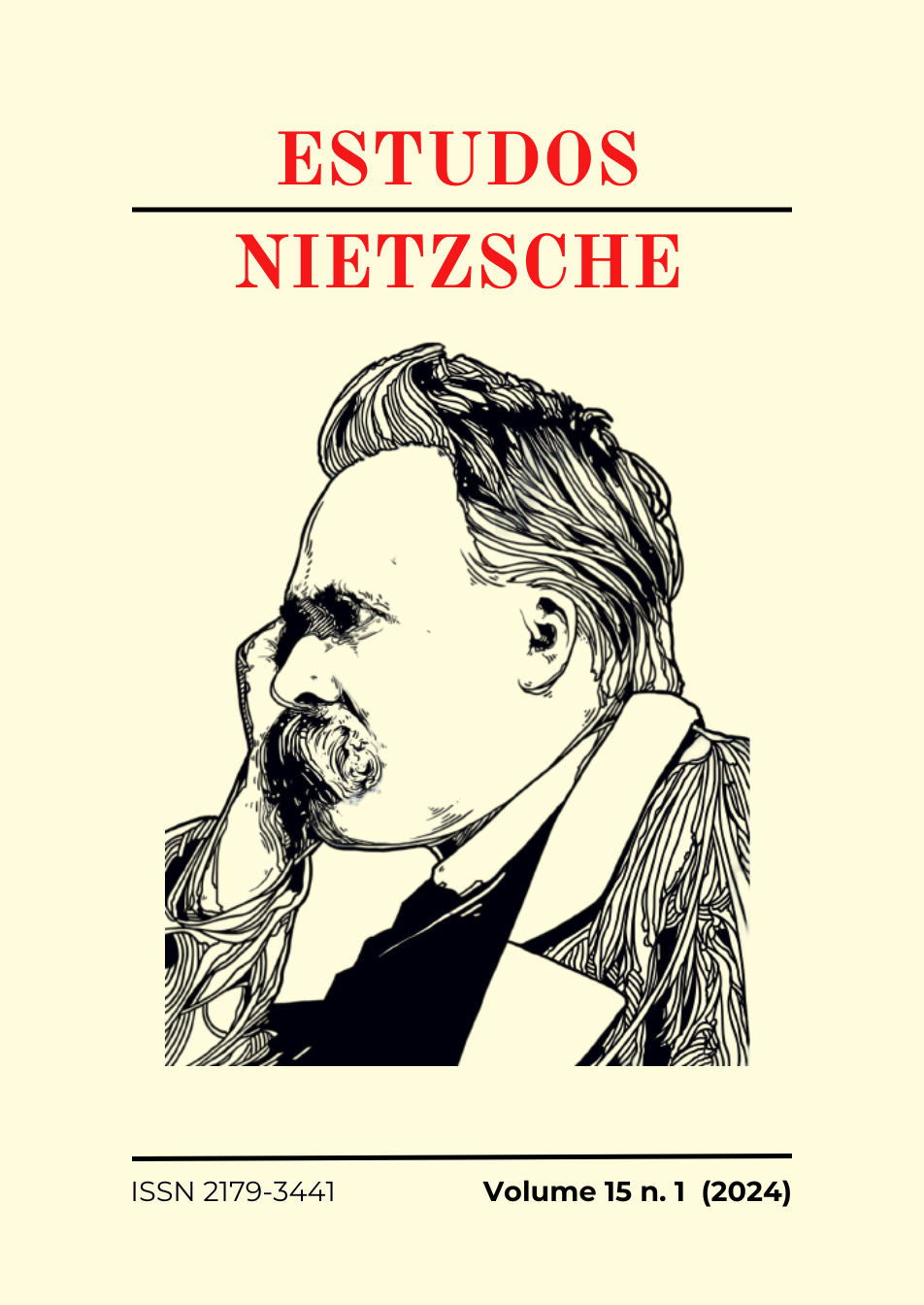Nietzsche e os marcos críticos do feminismo
Verdade, emancipação e esclarecimento “da mulher”
DOI:
https://doi.org/10.47456/en.v15i1.41508Keywords:
Nietzsche, Feminism, Truth, Emancipation, EnlightenmentAbstract
The objective of this paper is to interpret Nietzsche’s critique of emancipatory feminism under the aegis of the “enlightenment on the self...” of women (BM, Our Virtues, 232). Our hypothesis is that such a critique would point out that feminism is based on — and remains marked by — an instrumental reason derived from the faith in the intrinsically masculine truth criterion of the Western philosophical tradition (knowledge instinct/truth instinct). We will outline how such a belief eventually not only permeates first-wave feminist ideology (forged in the wake of the values of the French Revolution), but comports it, reflecting a certain alienation of woman’s “self” from a feasible “in-itself”. For this, we will use aphorism 232 from Beyond Good and Evil as a privileged reference for our reading. Following, we will show that the problem of feminism, endorsed by the Enlightenment notions of emancipation and enlightenment, for Nietzsche, is conditioned by the passive acceptance of man’s scientific way of being (and its truths). To conclude, we will take stock of the main discussions that have taken place in the course of this writing by remarking on important concepts such as that of body and nature. For, if in fact rational behavior reflects man’s artificial self and ultimately provides a subjective model to be applied to feminine nature, then we are inclined to hold that the task properly feminist and, consequently, “woman’s”, should be alternatively: the elaboration of herself from her own aesthetic potentialities conformed solely and exclusively to her creative (counter-imitative) nature.
Downloads
References
ALMEIDA, Patrícia S. Bagot. 2021a. Crítica de Nietzsche ao ideal da igualdade: contribuições à teoria feminista. Dissertação mestrado. Programa de Pós-Graduação em Filosofia da Faculdade de Filosofia da Universidade Federal de Goiás, 2021a.
ALMEIDA, Patrícia S. Bagot. Nietzsche e o controverso: ideal de emancipação feminina. In: Cadernos de Ética e Filosofia Política, v. 39, 2021b, p. 227–238.
ANSELL-PEARSON, Keith. Nietzsche como pensador político — uma introdução. Rio de Janeiro: Jorge Zahar, 1997.
BEHLER, Diana. Nietzsche view of woman in classical Greece. In: Nietzsche-Studien, Vol. 18, Issue 1, 2010, p. 359–376.
BENHABIB, Seyla; CORNELL, Drucilla (orgs.). Teoría feminista y teoria crítica: Ensayos sobre las sociedades de capitalismo tardío. Valencia: Alfons Magnànim, 1990.
CONNELL, Raewyn; PEARSE, Rebecca. Gênero: uma perspectiva global — compreendendo o gênero — da esfera pessoal à política — no mundo contemporâneo. Tradução Marília Moschkovich. 3ª ed. São Paulo: Versos, 2015.
DELBÓ, Adriana. Sobre o poder das mulheres no aforismo 68 de A Gaia Ciência. In: Cadernos de Ética e Filosofia Política, v. 39, 2021, p. 214–226.
DELBÓ, Adriana. Sobre a utilidade das verdades a respeito das mulheres. In: Modernos e Contemporâneos — International Journal of Philosophy, v. 5, n. 12, 2021 (p. 96–117).
DERRIDA, Jacques. Esporas: os estilos de Nietzsche. Rio de Janeiro: Nau, 2013.
GARCIA, Carla. Breve história do feminismo. São Paulo: Claridade, 2011.
GIACOIA, Oswaldo. “Nietzsche e o feminismo”. Revista Natureza Humana, volume 4, número 1, 2002, p. 9–31.
HAUBERT, Elisa. O conceito de linguagem em Nietzsche na obra “Escritos sobre Retórica”. Ítaca, Rio de Janeiro, v. 32, 2018.
IRIGARAY, Luce. Marine lover of Friedrich Nietzsche. New York: Columbia University Press, 1991.
MACHADO, Roberto. Nietzsche e a verdade. São Paulo: Paz e Terra, 1999.
MARTON, Scarlett. Da realidade ao sonho: Nietzsche e as imagens da mulher. Estudos Nietzsche, Curitiba, v. 1, n. 1, jan./jun., 2010, p. 161–179.
MARTON, Scarlett. Nietzsche e as mulheres: Figuras, imagens e tipos humanos. São Paulo: Autêntica, 2022.
MARTON, Scarlett. Nietzsche e a Revolução Francesa. In: Extravagâncias: ensaios sobre a filosofia de Nietzsche. São Paulo: Sendas e Veredas, 2009.
NYE, Andrea. Teoria feminista e as filosofias do homem. Tradução Nathanael C. Caixeiro. Rio de Janeiro: Record; Rosa dos Tempos, 1995.
NIETZSCHE, Friedrich. Além do Bem e do Mal: prelúdio a uma filosofia do futuro. Trad. Paulo César de Souza. São Paulo: Companhia das Letras, 1992.
NIETZSCHE, Friedrich. Assim falou Zaratustra: um livro para todos e para ninguém. São Paulo: Companhia das letras, 2011.
NIETZSCHE, Friedrich. Ecce Homo: como cheguei a ser o que sou. Trad. Paulo César de Souza. São Paulo: Companhia das Letras, 2005.
OPPEL, Frances. ‘Speaking of Immemorial Waters’ Irigaray with Nietzsche. In:¬¬¬ PATTON, Paul. Nietzsche, Feminism and Political Theory. London: Taylor & Francis e-Library, p. 88–110.
PERELMAN, Chaïm. Retóricas. São Paulo: Martins Fontes, 1997.
SANTOS, Laura Ferreira dos. “Leituras feministas de Nietzsche”. Interacções, n. 2. 2002, pp. 11-41, junho, 2016.
Downloads
Published
Issue
Section
License
Copyright (c) 2024 Fernando Machado

This work is licensed under a Creative Commons Attribution 4.0 International License.
Ao submeter o artigo, resenha ou tradução para a Estudos Nietzsche, o autor cede à revista o direito à primeira publicação do texto, mantendo, contudo, o direito de reutilizar o material publicado, por exemplo, em futuras coletâneas de sua obra.






